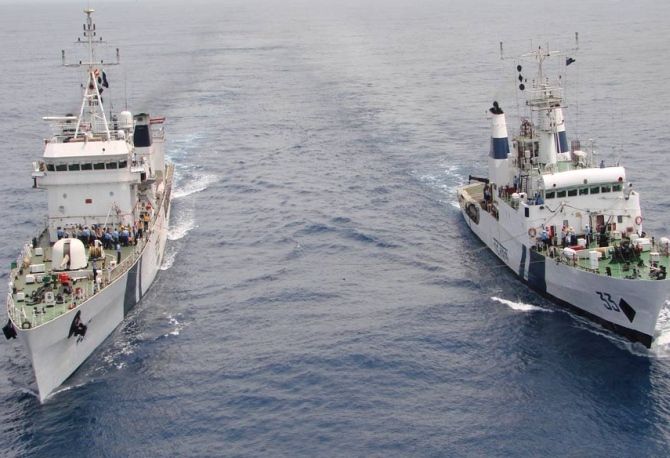 Seeking deeper economic ties and maritime security among countries in the Indian Ocean region, India on Friday said it is committed to building up Indian Ocean Rim Association in line with its own expanding bilateral ties with the members of the grouping.
Seeking deeper economic ties and maritime security among countries in the Indian Ocean region, India on Friday said it is committed to building up Indian Ocean Rim Association in line with its own expanding bilateral ties with the members of the grouping.
"We will be supportive in the expansion and further invigoration of its activities, from renewable energy and the blue economy to maritime safety and security, water science and greater institutional and think-tank networking," Foreign Secretary S Jaishankar said in a keynote address to the inaugural Indian Ocean Conference in Singapore.
"Given the history and traditions of the Indian Ocean, it is but appropriate that any serious effort at promoting its coherence would address issues of its unity and identity," he said.
"We must take full advantage of the ties of kinship and family that span the Indian Ocean and are an important part of its history," he said.
But more active initiatives are also needed, said the foreign secretary, drawing attention to Project Mausam, which promotes archaeological and historical research on cultural, commercial and religious interactions.
"If this is an example of a contemporary initiative to revive the ocean's identity, let me emphasise that there are many other supporting endeavours that contribute to the same objective," he said.
He also called for direction to create the connectivity that promotes a sharper Indian Ocean personality to emerge.
Jaishankar illustrated on India's commitment to the region.
"We are similarly looking at more aggressively developing some of our 1200 islands. Road and rail development projects are improving internal logistical efficiency. Of particular significance is the steady unfolding of the Delhi-Mumbai Industrial Corridor.
"We expect this to be followed by an eastern corridor and a southern one covering Bengaluru to Chennai. If you juxtapose these infrastructure initiatives with the 'Make in India' programme, the implications for the Indian Ocean are quite evident," he told some over 300 delegates from 21 member states at the conference.
"None probably would be opposed but few actually have the necessary enthusiasm or appetite," he said.
At a diplomatic level, promoting greater interaction among the groupings formed by littoral states would itself make an important contribution to the Indian Ocean, he said.
But more important, it is necessary to bridge physically the boundaries between them, he said.
"A good example is the India-Myanmar border where the SAARC meets ASEAN. While land connectivity is obviously critical, we must also recognise that the under-development of maritime infrastructure is itself largely responsible for the profile of the Indian Ocean," he said.
Jaishankar also spoke on the limitation of hinterland development around the Indian Ocean.
Part of the Indian Ocean's limitation was the narrowness of its coastal culture. As unified national societies emerged in Asia, the psychological distance from the ocean has also narrowed, Jaishanker said.
"Hinterland economies have increasingly become linked to maritime trade. It is apparent that the development of their infrastructure can be a game changer in elevating the importance of the Indian Ocean," he said.
"Let me offer examples from India itself in support of this line of thinking. We are working on ambitious plans for port and port-led development that would make our 7500 km coastline more relevant to the future of the Indian Ocean and India," he said.
Later, during a question and answer session he said any Indian government in the conceivable future will keep addressing the issues of connectivity with the South Asian region.
"I can imagine that any government in the conceivable future will address issues like connectivity," he said, pointing out that South Asia remains the world's most difficult part of the world to get around.
South Asian states will have work this out among themselves, he said, citing the well integrated regions on the East and West of South Asia.
Touching on India's immediate neighbourhood, he said, "There is no question, for us the toughest problem in our foreign policies are our immediate neighbourhood".
"We know that there is tough work to be done in the neighbourhood but I would again suggest that if you look at the record. Look at the India Bangladesh relationship -- I cannot imagine anybody who had predicted it just a few years ago."
He also highlighted the possibilities that can open up in relationships with Myanmar or in Sri Lanka.
"India is a country big enough to work its neighbourhood and work beyond," Jaishankar said.
"And if we don’t ourselves sensitively harmonise with our neighbourhood, we will not have the credibility to work beyond. The two steps are sort of related in many ways," he responded to a question from the delegates.










